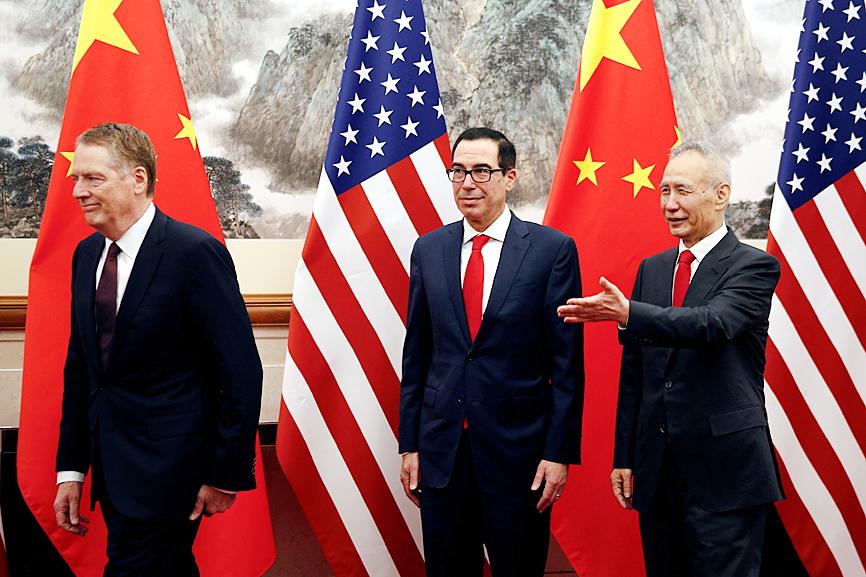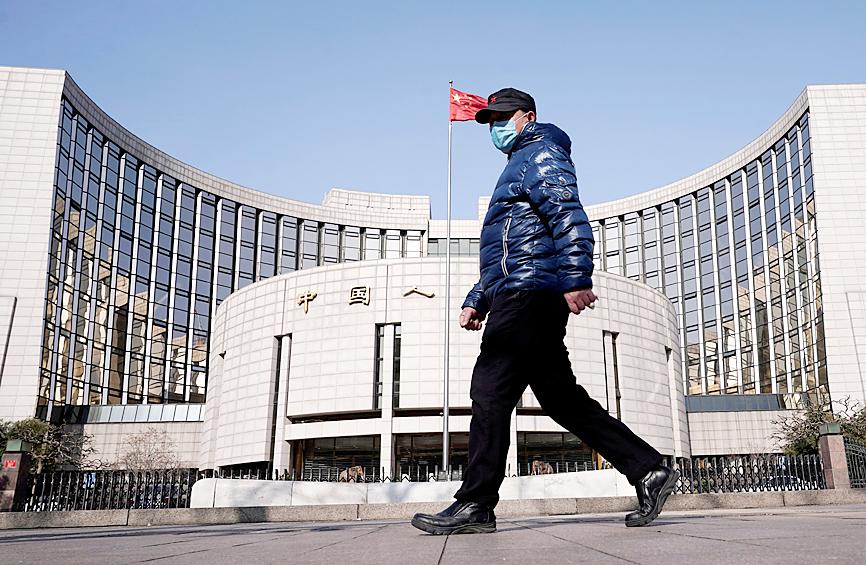The Chinese government on Thursday told smaller, local financial institutions to step up risk management and avoid “excessive” growth, stepping up a campaign to clamp down on a build-up in debt as the economy stabilizes.
At a meeting of the Chinese Financial Stability and Development Committee, Chinese Vice Premier Liu He (劉鶴) called for “zero tolerance” on illicit activities, telling regulators to improve supervision of shareholders and owners of financial institutions, risk concentration, connected transactions and data authenticity, an official statement said.
With the COVID-19 pandemic largely contained and the economy rebounding, policymakers are shifting their focus to deleveraging, a long-standing goal shelved during a trade dispute with the US and further delayed by the pandemic.

Photo: Reuters
Last year’s stimulus pushed debt to almost 280 percent of annual economic output, with banks alone doling out a record 19.6 trillion yuan (US$3 trillion) in cheap credit.
“The committee meeting signals that China will conduct a systematic review of local financial institutions, especially the ones related to local governments, to resolve risks,” said Cao Heping (曹和平), a professor of economics at Peking University.
The People’s Bank of China has also told the nation’s major lenders to curtail loan growth for the rest of this year after a surge in the first two months stoked bubble risks, people familiar with the matter have said.

Photo: Reuters
At a meeting with the central bank on March 22, banks were told to keep new advances this year at roughly the same level as last year.
Over the past three years, the banking regulator has zeroed in on the nation’s about 4,000 small city and rural banks, which are struggling with bad loans and poor corporate governance.
These institutions have amassed one-quarter of total banking assets by the end of last year and their lending growth — fueled by interbank borrowing and shadow financing — has often outpaced bigger rivals.
Confidence in smaller banks was jolted in the middle of 2019, when regulators seized control of a lender in Inner Mongolia — the first such move in two decades — and imposed losses on some creditors.
Authorities have since orchestrated bailouts of two other banks and intervened to quell at least two bank runs by jittery depositors.

SETBACK: Apple’s India iPhone push has been disrupted after Foxconn recalled hundreds of Chinese engineers, amid Beijing’s attempts to curb tech transfers Apple Inc assembly partner Hon Hai Precision Industry Co (鴻海精密), also known internationally as Foxconn Technology Group (富士康科技集團), has recalled about 300 Chinese engineers from a factory in India, the latest setback for the iPhone maker’s push to rapidly expand in the country. The extraction of Chinese workers from the factory of Yuzhan Technology (India) Private Ltd, a Hon Hai component unit, in southern Tamil Nadu state, is the second such move in a few months. The company has started flying in Taiwanese engineers to replace staff leaving, people familiar with the matter said, asking not to be named, as the

The prices of gasoline and diesel at domestic fuel stations are to rise NT$0.1 and NT$0.4 per liter this week respectively, after international crude oil prices rose last week, CPC Corp, Taiwan (台灣中油) and Formosa Petrochemical Corp (台塑石化) announced yesterday. Effective today, gasoline prices at CPC and Formosa stations are to rise to NT$27.3, NT$28.8 and NT$30.8 per liter for 92, 95 and 98-octane unleaded gasoline respectively, the companies said in separate statements. The price of premium diesel is to rise to NT$26.2 per liter at CPC stations and NT$26 at Formosa pumps, they said. The announcements came after international crude oil prices

DOLLAR SIGNS: The central bank rejected claims that the NT dollar had appreciated 10 percentage points more than the yen or the won against the greenback The New Taiwan dollar yesterday fell for a sixth day to its weakest level in three months, driven by equity-related outflows and reactions to an economics official’s exchange rate remarks. The NT dollar slid NT$0.197, or 0.65 percent, to close at NT$30.505 per US dollar, central bank data showed. The local currency has depreciated 1.97 percent so far this month, ranking as the weakest performer among Asian currencies. Dealers attributed the retreat to foreign investors wiring capital gains and dividends abroad after taking profit in local shares. They also pointed to reports that Washington might consider taking equity stakes in chipmakers, including Taiwan Semiconductor

A German company is putting used electric vehicle batteries to new use by stacking them into fridge-size units that homes and businesses can use to store their excess solar and wind energy. This week, the company Voltfang — which means “catching volts” — opened its first industrial site in Aachen, Germany, near the Belgian and Dutch borders. With about 100 staff, Voltfang says it is the biggest facility of its kind in Europe in the budding sector of refurbishing lithium-ion batteries. Its CEO David Oudsandji hopes it would help Europe’s biggest economy ween itself off fossil fuels and increasingly rely on climate-friendly renewables. While